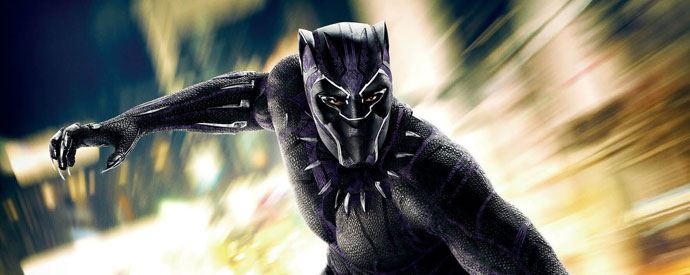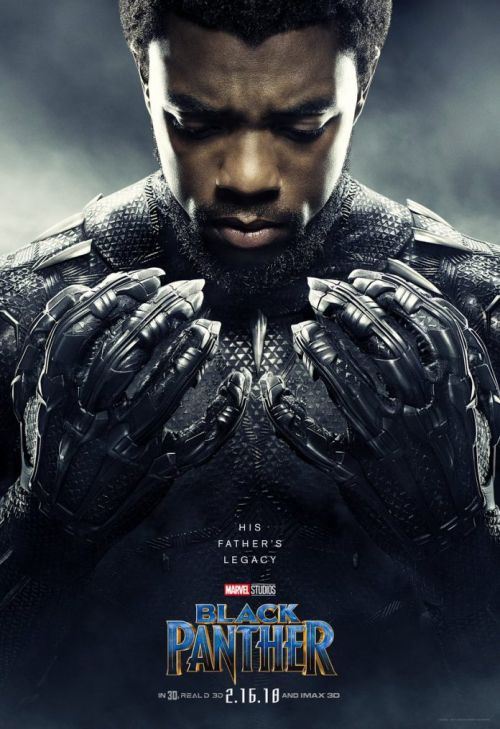Movies /
Comics Movie Reviews
Black Panther the Movie

By Hervé St-Louis
February 20, 2018 - 09:14
The heir to the throne of the secretive nation called Wakanda in Africa see his position as the Black Panther challenged by the child of his uncle, left in the United States as a kid. Killmonger wants to usurp the crown of Wakanda so that he can wage war against the white men who have destroyed black lives across the world. Will Killmonger succeed and replace the Black Panther on the throne of Wakanda?
I was late at watching this film and managed to avoid all spoilers and trailers. That’s how movies should be enjoyed. But since Black Panther represents so much to so many people, it may be difficult to avoid knowing everything about it before viewing it. I will do my best to review this film without spoilers. The plot is simple and without many dedicated arcs. The most significant one was set in South Korea and gave the film the
James Bond qualities one wish Idris Elba would channel if he could play 007. After the success and response from audiences to Black Panther, smart studios would be dumb not to cash in on the black action hero craze.
So there is a James Bond moment, including the casino scene and the car chase but what was marvelous about this, is that the locals were not just props as they tend to be in other movies set in “exotic locales.” The brunt of the movie was set in Wakanda where very few white men ever set foot. What Black Panther did was normalize what has rarely been seen in the past. It was an entire movie with black actors set in a black locale without many white characters.
One of the two main white characters’ roles was changed from the comics. CIA Agent Everett K. Ross no longer is the every man that writer Christopher Priest used to introduce Black Panther to American readers. Black Panther in Priest’ comic was not the focal point of the series. We saw his adventures through the eyes of Ross. In the Black Panther movie, director Ryan Coogler dispense with this device and introduces the Black Panther and Wakanda to readers on their terms without being interpreted by white men.
And so the rest of the film went on from the perspective of black people. In the 1980s and early 1990s, there was a brief period in popular culture where such things were common with the
Cosby Show,
Coming to America, and so on. Audiences of all culture flocked to these productions. But the experiment ended even though these stories told from the perspective of blacks had found resonance with whites.
Marvel allowed Coogler and his writing team to criticize white people in this film and make frequent jokes at their expenses without editing too much. Well, perhaps they did edit out the most salacious bits but just enough was left to make black viewers chuckle. Of all the Marvel films, this is the least funny. What it did was give a serenity to the characters that made petty jokes unnecessary.
There have been many super hero films starring black leads. However, it was fitting that the best and most grandiose of them would be about the Black Panther, the first mainstream black super hero in history. Black Panther has always been controversial. He was created by Stan Lee and Jack Kirby before the establishment of the radical black populist party known as the Black Panthers in the United States. Because of the negative association with his name, the character when by Black Leopard and just the Panther for a while. But the Black Panther was the best moniker and he did outlive the radical group.
In the age of Trump, comicsgate and gamergate, the Black Panther is more important than ever. Just like the Wonder Woman film, he proved that there were other stories that could be told with super heroes that could entertain anyone. Five years ago, I would have thought such a film a risk. Now, movies like Black Panther are normal.
The character does not need to be white for audiences to relate to him. Racialized audiences knew this all along. They have been subjected to white heroes for centuries. But white viewers did not know this. Many will resist seeing this film or feel awkward or as fraud if they admit to themselves that they did enjoy it. It is odd because Black Panther’s story is universal and there five billion people that can attest that you do not need to look like the main hero, to get his story.
It is somewhat unfortunate that my review of Black Panther has to deal with some of the politics and reticence’s of people towards such a character. I should be able to focus solely on the plot and the action. The fight sequence in South Korea was rapid but a bit too dark. It was difficult to see all of the cool moves happening as there were so many.
However, the set design for Wakanda was grandiose. The main city was beautiful and cosmopolitan. The Wakandans seemed happy there in this mecca. There was an effort made to give the science fiction element African designs and that worked. The holograms were based on sand and earth. Animal motifs abound but they were circumscribed by geometric shapes unlike those of Jack Kirby.
What was most important was the many tribal designs and representations of African culture. For example, one of the elder tribesman sported a mouthpiece that extended his lower lip. At first, I would cringe at the blunt representation of something so archaic and so different from Western body modifications and art. But the more we saw that man, the more normal his presence seemed.
Another thing which was of great interest to me was the variety of black ethnicity represented in the film. To many people, all black people look the same. While Black Panther (Chadwick Boseman), and his mother, Queen Ramonda (Angela Bassett) are of Yoruba origins, being African American actors, Nakia (Lupita Nyong’o), Okoye (Danai Gurira), and W’Kabi (Daniel Kaluuya) could be of different African ethnic groups. In essence that makes Wakanda, a multicultural society (although to be fair, Marvel' casting team just recruited actors that fit the bill instead of trying to set a message).
Black Panther was the best Marvel movie that I have seen and the best super hero film I recall. It is in the same vein as
Wonder Woman where main characters with strong English accents are featured for a whole movie without the need to show “regular English.” Black Panther is evidently a movie for everyone to see.
I will conclude this by addressing a veiled criticism of the film. Many will say that while it is a grandiose film, it represents an idealized and fictional African society that never was. Well, there have been several African nations with the same resolve as Wakanda in history. There is also one nation on Earth right now that has played a role similar to Wakanda and has been underestimated and shun by the nations of the world.
Haiti, the small Caribbean nation that took its independence from the French over 200 years ago is the closest thing to Wakanda today. Haiti does not have vibranium on its land but it has had gold and many other riches which were exploited by others. But the most important resource Haiti has is its people. And Haitians are just like Wakandans in their resolve to preserve their culture and maintain a distinct identity that is not unlike that of neighbouring Caribbean nations while being steadfast in the defence of their independence. Liberty, fraternity, and equality only gained meaning when the Haitians stole it from the French and gave it to the rest of the world.
While Killmonger may have preferred drowning to enslavement, the Haitians have proven that enslaved people are not lesser people and can break the bonds imposed by whites. Wakandans were never enslaved but their spirit is very familiar to anyone who understands black cultures.
Rating: 10 /10
Last Updated: January 17, 2025 - 08:20

